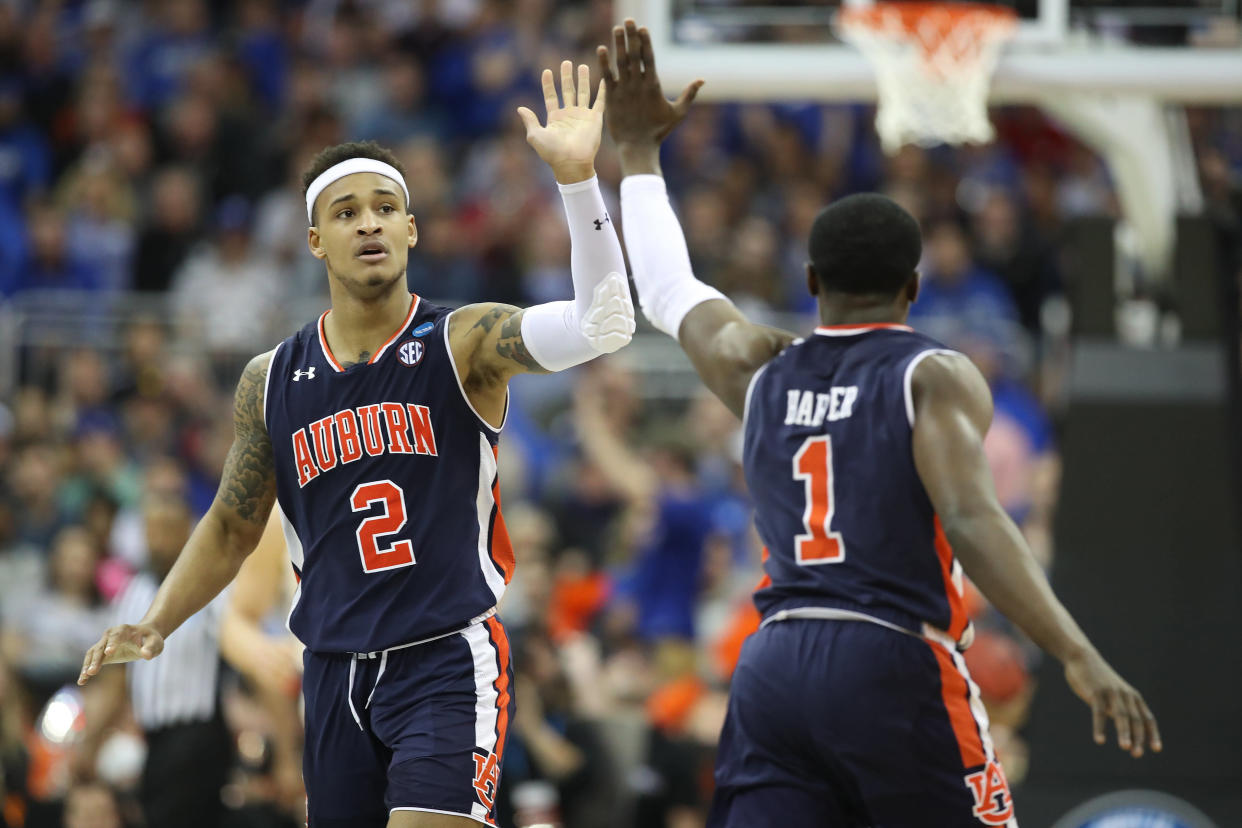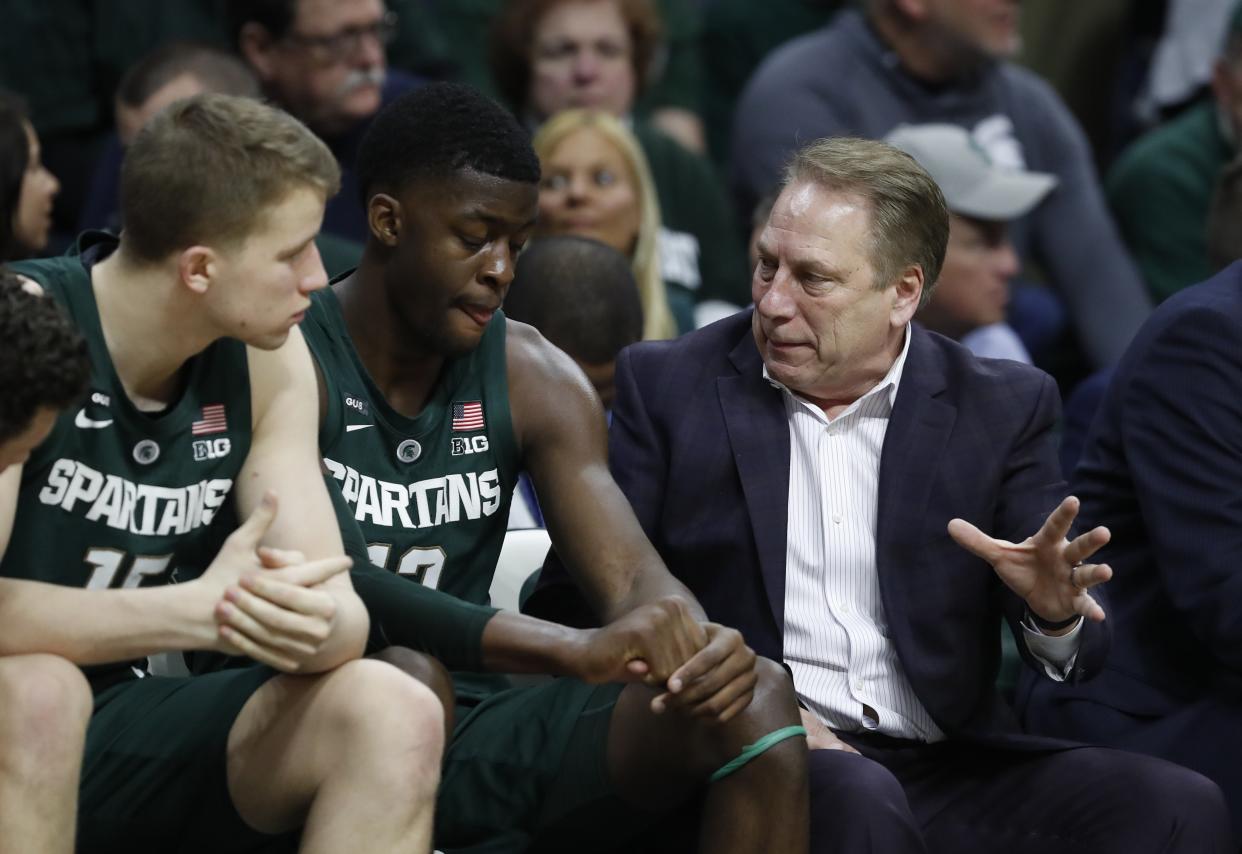4 key questions that will decide the 2019 Final Four
The 2019 Final Four is near. Virginia, Auburn, Michigan State and Texas Tech have descended on Minneapolis. The wait for March Madness’ annual culmination is almost over.
With Saturday’s games – No. 1 Virginia vs. No. 5 Auburn (6:09 ET, CBS), No. 2 Michigan State vs. No. 3 Texas Tech (8:49 ET, CBS) – approaching, Yahoo Sports’ college basketball writers convened to answer the four most intriguing questions that will be posed this weekend – two per matchup.
1. Can Auburn speed up Virginia? (Or, will it even try?)
Saturday’s first matchup is a stylistic clash. Virginia is the slowest team in college basketball. Its games feature, on average, 60.6 possessions per team. Its standard offensive trip lasts almost 21 seconds. Those marks rank 353rd and 352nd, respectively, out of 353 Division I teams. Auburn, on the other hand, scored its biggest upset of the tournament with 97 points on 75 possessions against North Carolina. Its typical offensive jaunt is only 16.5 seconds. It has only played one game all season at a pace slower than the Cavs’ average.
So in theory, an up-tempo contest would suit Auburn. Attack Virginia’s stifling defense before it gets set, the thinking goes. Speed up the top seed’s methodical, precise offense. Push Virginia out of its comfort zone, into a track meet, where Jared Harper and Bryce Brown will thrive.
However ... there are equally compelling reasons why Auburn might be perfectly happy with a grind. First, the macro view: It’s a 5.5-point underdog. It’s the inferior team. The fewer opportunities it gives a superior foe to exert that superiority, the better off it’ll be.
That’s especially true without the injured Chuma Okeke. The Tigers are shorthanded. They might need 40 minutes apiece from Harper and Brown, who carried them to an Elite Eight victory over Kentucky. Head coach Bruce Pearl even admitted that his second-half strategy was to “get out of the way, get the ball to Jared or Bryce.” That’s probably his best bet again – if Harper and Brown have the legs. They scored 35 of Auburn’s 47 second-half and overtime points last round in a game played at a 62-possession pace in regulation. They also each needed six minutes of rest. Could they be as prolific without breathers, and/or at a quicker pace?
Thus, the pace question morphs into: Can Auburn get the best of both worlds? Can it use tempo to occasionally manufacture space for Harper and Brown, but do so selectively to keep them fresh? Can it disrupt Virginia’s offense, but not get swept away by a feeling that it must unsettle the game to win?
The answer will come from a tug-of-war between the nation’s best turnover defense and one of its most secure offenses. Auburn’s selective tempo pushing depends on its live-ball turnover forcing. The Tigers turn opponents over on 24.9 percent of their possessions. The Cavs only cough up the ball on 14.7 percent of theirs. That differential will be the widest of any D-I game all season. Something has to give. Whichever side doesn’t will likely be playing again Monday night. — Henry Bushnell

2. Will Virginia match Auburn’s strength or attack its weakness?
In the aftermath of Auburn’s Elite Eight triumph, Okeke’s sideline presence was celebrated as an emotional catalyst. Had Kentucky won, though, his on-court absence would have been the story. P.J. Washington and Reid Travis combined for 37 points on 23 field goal attempts (and seven missed free throws to boot).
Without Okeke, Auburn is undermanned up front. And while Virginia’s frontcourt doesn’t have a low-post scorer with Washington’s skill, it has the size to overpower the Tigers. The question is whether Tony Bennett will allow it to.
Bennett’s rotation has fluctuated situationally. His three-man core (Ty Jerome, Kyle Guy, De’Andre Hunter) will rarely sit. For the rest, there is little certainty. Here are their minutes against Gardner-Webb, Oklahoma, Oregon and Purdue (OT*), respectively:
Mamadi Diakite (6-foot-9 F/C): 27, 28, 35, 42*
Kihei Clark (5-foot-9 G): 36, 33, 37, 24*
Jack Salt (6-foot-10 C): 5, 2, 3, 34*
Braxton Key (6-foot-8 F): 11, 21, 7, 2*
Jay Huff (7-foot-1 C): 5, 9, 1, 0*
Bennett can play a no-true-big lineup that goes 5-9, 6-2, 6-5, 6-7, 6-8. He can also roll out a two-big lineup that goes 6-2, 6-5, 6-7, 6-9, 6-10.
Diakite has played himself into near-40-minute territory over the past two weeks. But Salt, a senior with brute strength, is the eye-opening example. He barely saw the floor through three rounds, then was excellent in his supporting role against Purdue.
If Bennett goes back to that Hunter-Diakite-Salt lineup against Auburn, the Tigers don’t really have a counter. They’re already a poor defensive rebounding team. As long as Virginia can get first shots up, the underdogs will be in trouble.
But does Bennett trust that big lineup to contain Harper and Brown? Clark is probably the most suitable matchup for Harper. And the Purdue game was a Carsen Edwards-related anomaly. Only opponents with big guards have driven Clark to the bench recently. He should fit seamlessly into Saturday’s game.
If Clark is on the court, though, Salt probably won’t be.
Auburn’s best hope is another Brown-Harper explosion. Bennett will likely mix and match lineups chiefly to prevent that explosion. Which might mean Virginia can’t take full advantage of Auburn’s weakened front line. It’ll be up to Bennett to manage the give-and-take. — Henry Bushnell

3. Can Michigan State take care of the ball against Texas Tech?
There’s one issue that has popped up in many of Michigan State’s losses the past few years. Too often, the Spartans struggle to take care of the basketball.
Michigan State turns the ball over on 18.5 percent of its possessions this year, an improvement over the last two seasons but still a tick below the national average. In the Spartans’ six losses this season, they’ve committed 15.8 turnovers per game, compared to 10.4 per game in their 32 victories.
Taking care of the ball should be especially important against an aggressive Texas Tech defense that thrives on producing takeaways. The Red Raiders force turnovers thanks to the quick hands of ball-hawking guard Matt Mooney, the long arms of perimeter stopper Jarrett Culver and the instincts and timing of shot blockers Tariq Owens and Norense Odiase.
Three keys for any Texas Tech opponent are limiting turnovers, scoring in transition before the Red Raiders’ vaunted defense is set and generating extra possessions via the offensive glass when help defenders take themselves out of rebounding position. Michigan State’s track record is strong in the latter two of those areas, but how the Spartans adjust to Texas Tech’s hands always being around the ball will be key. — Jeff Eisenberg
4. Can Texas Tech score enough to keep Michigan State out of transition?
Airtight defense has been Texas Tech’s trademark this season, but the Red Raiders’ late-season jump from very good to elite coincided with their offense improving. They went from outside the top 100 in adjusted offensive efficiency entering February to cracking the top 30 just two months later.
While Culver has blossomed from role player to All-American because of his ability to generate his own shot off the dribble, Texas Tech’s offense only became explosive when his supporting cast started to ease the burden on him. Mooney creates scoring chances for himself and his teammates off the dribble, Davide Moretti is an elite spot-up shooter and Brandone Francis, Deshawn Corprew and Kyler Edwards can all make shots too.
Michigan State’s top-10 defense will be one of the best Texas Tech has encountered, though the Spartans aren’t aggressive enough to take advantage of the Red Raiders’ lack of a true point guard. Texas Tech has scored at least one point per possession in each of its past 14 games, but Michigan State will play positionally solid defense, force contested shots and surrender few second-chance opportunities.
For Texas Tech, making baskets will be key for more than just the obvious reasons. The Red Raiders need to score to keep Michigan State out of transition and force the Spartans to have to attack a set defense. — Jeff Eisenberg
More from Yahoo Sports:
